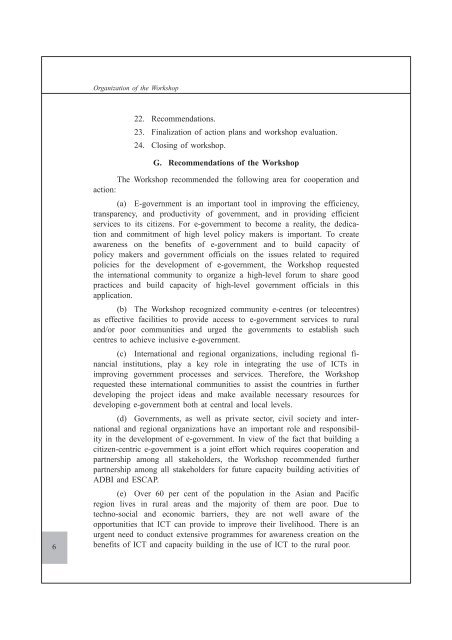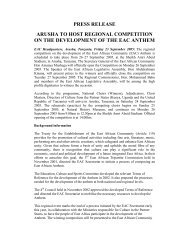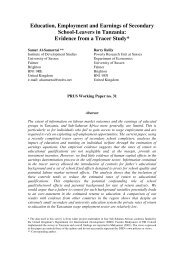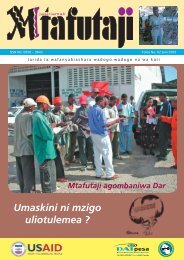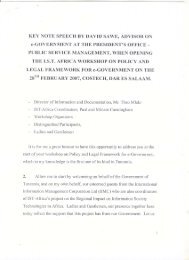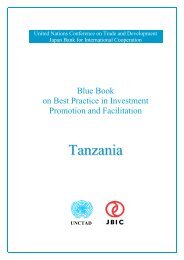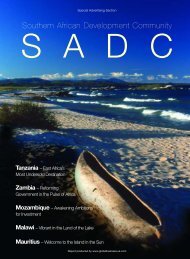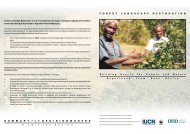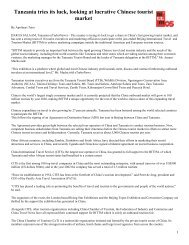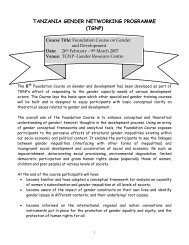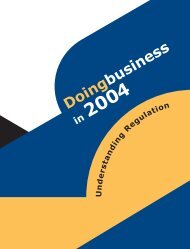Designing e-Government for the Poor - Tanzania Development ...
Designing e-Government for the Poor - Tanzania Development ...
Designing e-Government for the Poor - Tanzania Development ...
You also want an ePaper? Increase the reach of your titles
YUMPU automatically turns print PDFs into web optimized ePapers that Google loves.
6<br />
Organization of <strong>the</strong> Workshop<br />
22. Recommendations.<br />
23. Finalization of action plans and workshop evaluation.<br />
24. Closing of workshop.<br />
G. Recommendations of <strong>the</strong> Workshop<br />
The Workshop recommended <strong>the</strong> following area <strong>for</strong> cooperation and<br />
action:<br />
(a) E-government is an important tool in improving <strong>the</strong> efficiency,<br />
transparency, and productivity of government, and in providing efficient<br />
services to its citizens. For e-government to become a reality, <strong>the</strong> dedication<br />
and commitment of high level policy makers is important. To create<br />
awareness on <strong>the</strong> benefits of e-government and to build capacity of<br />
policy makers and government officials on <strong>the</strong> issues related to required<br />
policies <strong>for</strong> <strong>the</strong> development of e-government, <strong>the</strong> Workshop requested<br />
<strong>the</strong> international community to organize a high-level <strong>for</strong>um to share good<br />
practices and build capacity of high-level government officials in this<br />
application.<br />
(b) The Workshop recognized community e-centres (or telecentres)<br />
as effective facilities to provide access to e-government services to rural<br />
and/or poor communities and urged <strong>the</strong> governments to establish such<br />
centres to achieve inclusive e-government.<br />
(c) International and regional organizations, including regional financial<br />
institutions, play a key role in integrating <strong>the</strong> use of ICTs in<br />
improving government processes and services. There<strong>for</strong>e, <strong>the</strong> Workshop<br />
requested <strong>the</strong>se international communities to assist <strong>the</strong> countries in fur<strong>the</strong>r<br />
developing <strong>the</strong> project ideas and make available necessary resources <strong>for</strong><br />
developing e-government both at central and local levels.<br />
(d) <strong>Government</strong>s, as well as private sector, civil society and international<br />
and regional organizations have an important role and responsibility<br />
in <strong>the</strong> development of e-government. In view of <strong>the</strong> fact that building a<br />
citizen-centric e-government is a joint ef<strong>for</strong>t which requires cooperation and<br />
partnership among all stakeholders, <strong>the</strong> Workshop recommended fur<strong>the</strong>r<br />
partnership among all stakeholders <strong>for</strong> future capacity building activities of<br />
ADBI and ESCAP.<br />
(e) Over 60 per cent of <strong>the</strong> population in <strong>the</strong> Asian and Pacific<br />
region lives in rural areas and <strong>the</strong> majority of <strong>the</strong>m are poor. Due to<br />
techno-social and economic barriers, <strong>the</strong>y are not well aware of <strong>the</strong><br />
opportunities that ICT can provide to improve <strong>the</strong>ir livelihood. There is an<br />
urgent need to conduct extensive programmes <strong>for</strong> awareness creation on <strong>the</strong><br />
benefits of ICT and capacity building in <strong>the</strong> use of ICT to <strong>the</strong> rural poor.


